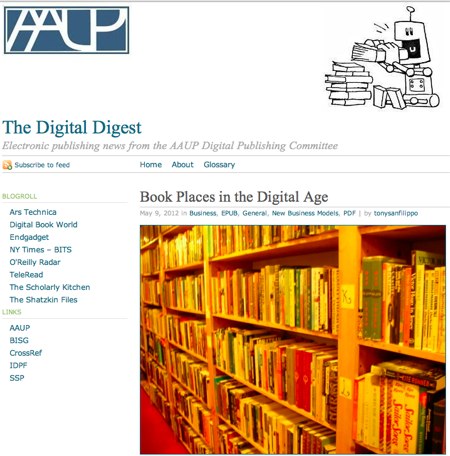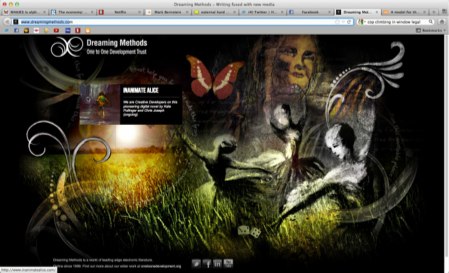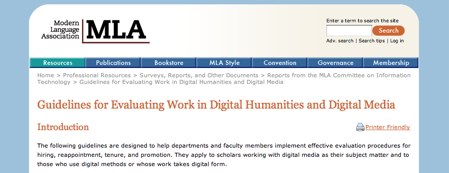May 31, 2012
Mark Bernstein
The schedule is out for Narrative and Hypertext 2012, a workshop slated for June 25 in Milwaukee. Papers include:
- Geoffrey Draper: An Approach to Hypertext Fiction for Mobile Devices
- Heather Packer: MemoryBook: Generating Narratives from Lifelogs
- Charlie Hargood: The Narrative Braid: A Model for Tackling The Narrative Paradox in Adaptive Documentaries
- Alex Mitchell: The HypeDyn Hypertext Fiction Authoring Tool
- Carolyn Hill: Hypertext as an Expression of the Rhizomatic Self
- Mark Bernstein: Gothic
- Anne Canavan: We Interrupt This Broadcast: Highly Reliable Narrators In Radio Drama
- Stacey Mason: Glitched Lit: Possibilities for Databending Literature
May 31, 2012
Stacey Mason
Failbetter Games, the company behind fabulous narrative web game Fallen London, is taking registrations for beta testers for StoryNexus, a new narrative platform that will allow users to build and play narrative games.
May 29, 2012
Stacey Mason
Tony Sanfilippo offers an interesting approach to the offline bookstore, using a model that incorporates the very forces that have undermined the bookstore we have known. In addition to the typical Borders-esque book displays, his bookstore includes a print-on-demand machine that customers use for custom orders, and sell subscriptions that allow for renting books or downloading ebooks without DRM.
The idea of returning to 18th and 19th century book culture with its private libvraries and custom-bound books is especially intriguing. Imagine students who could interlace blank pages into books for note-taking. Or combining a text and a critical study of that text into one volume.
Sanfilippo acknowledges that the model might not work, but it’s refreshing to see experimentation and thoughtful consideration in our approach to the local bookstore.
Our friends over at Dreaming Methods have designed a beautiful new site to showcase their hypertext portfolio. Of interest to hypertext readers and web designers alike.
My critique of free web distribution met a lot of resistance, but rather than rehashing the debates of previous decades or arguing for extremes, it might behoove us to stop and take a look around. Literature is not the only form that is struggling to earn money from digital content; movies, television, music, and journalism face the same problem. Everyone wants content to be as cheap as possible for consumers, but we still need to provide artists with incentives to create.
First, there are the models we already have. The pay-per-copy system has been working for a long time and probably isn't going anywhere. Self-publishing will continue to shape the economic landscape and eliminate middle parties (wholesalers, retailers, publishers to some extent) but publishers should not be scorned or counted out. Publishers offer the advantage of polish and promotion, and serve as important purveyors of taste. As more people self-publish, readers--lost in a sea of works--will look for a shortcut to the good stuff. Publishers can help. Of course, self-publishing and distribution can also rely on pay-per-copy and as more people turn to this the role of the publisher may change drastically (perhaps writers will begin to pay publishers more as consultants). Or perhaps we might see publisher subscription models à la Netflix.
Free distribution offers different advantages. A writer might want a larger audience until she establishes a name for herself. Or perhaps her income is coming from a grant or endowment. Free distribution can serve as a gateway or advertisement for other paying work, but the key point is that the writer's funding must come from an external source. Much of eLit is currently being given away, and while that has short-term advantages, it is unsustainable to the industry long-term. However, there are other ways to avoid the pay-per-copy model and still pay writers.
In a fascinating conversation, William Cole pointed out that digital comics are often self-referential and interlinked in a way that suggests we already have popular eLit right under our noses. These have been very commercially successful, largely through the marketing of merchandise. This model requires a very large fanbase, but it's reasonable to think that even if Hunger Games were freely distributed, Suzanne Collins could still make a killing selling mockingjay pins and replica bows and quivers. Applying this model to eLit opens the way for interesting cross-over ideas, like selling an art print from a visually beautiful work, or offering paid copies of the author's notes.
Downloadable content or bonus features, as long as they’re used for good rather than evil, are another option that has already been successful in the games industry. I can imagine a hard-boiled hypertext in which the addition of another character’s point of view, thoughtfully woven into existing content, could add an interesting dimension to the narrative.
Another option is that literature might adopt a model similar to the music industry in that reading and writing might become a more performative act. Works would then serve as an advertisement for paid author talks or readings, similar to how musicians make vastly more money from concerts than album sales.
And of course, there's always the journalism model of ad space, which has also worked for musicians and youtube comedians. This and the related freemium model are possibilities for eLit. Or, heaven forbid, product placement (may it never come to that).
It's important to note that each form seems to be finding its own solutions, and different artists are finding different solutions within the same medium. Jonathan Coulton and Rebecca Black, though both musicians, made their money in very different ways. What works for one person, company, or form may not work for you. But we must assess what readers want and provide them with convenient ways to pay authors.
The MLA recently issued guidelines for evaluating work in digital humanities and digital media.
Institutions and departments should develop written guidelines so that faculty members who create, study, and teach with digital objects; engage in collaborative work; or use technology for pedagogy can be adequately and fairly evaluated and rewarded. The written guidelines should provide clear directions for appointment, reappointment, merit increases, tenure, and promotion and should take into consideration the growing number of resources for evaluating digital scholarship and the creation of born-digital objects.
The fact that this even needs to be stated is ridiculous, but it might be a step in bridging some of the evaluation gaps between the humanities and the sciences (for example, different approaches to co-authorship, conferences vs. journals, etc.) that are used to evaluate scholarship.



